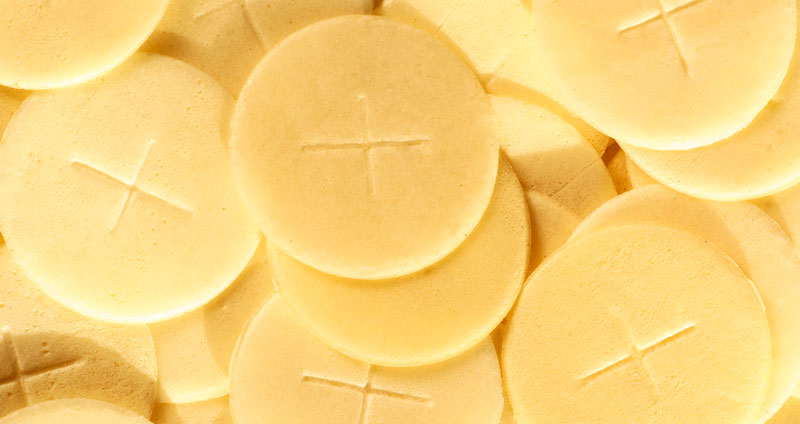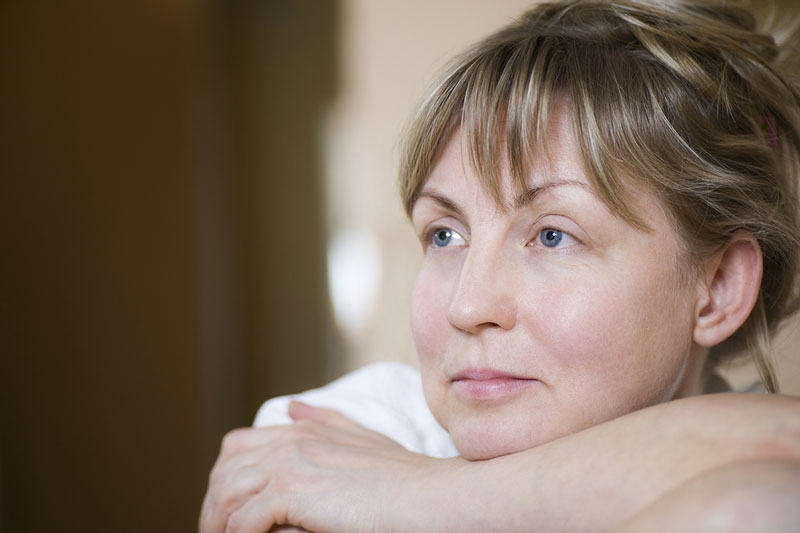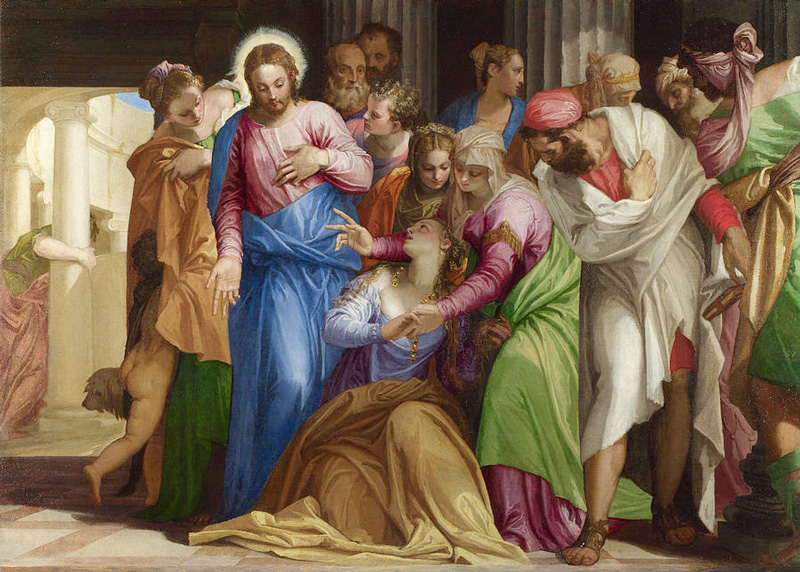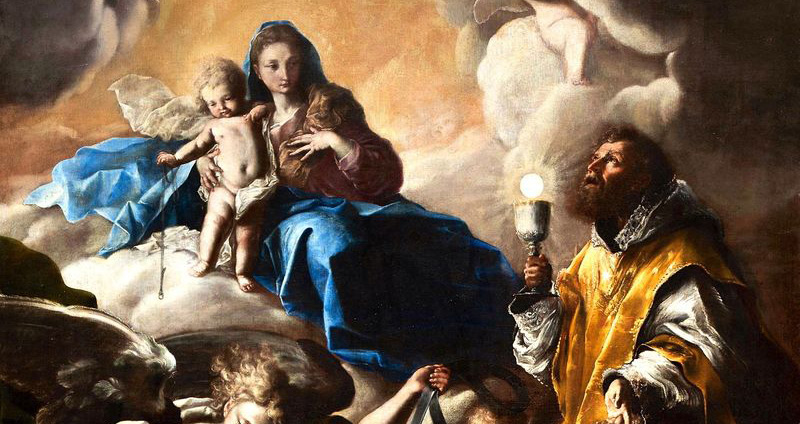
For Catholics, the Eucharist is the most important sacrament and the center of faith itself.
The Catechism of the Catholic Church calls the Eucharist “the source and summit of Christian life” (1324) and “the sum and summary of our faith” (1327). All other works of the Church spring from it:
“The other sacraments, and indeed all ecclesiastical ministries and works of the apostolate, are bound up with the Eucharist and are oriented toward it. For in the blessed Eucharist is contained the whole spiritual good of the Church, namely Christ himself.” (1324)
Other than priests and deacons, only one other group of people has the extraordinary privilege of distributing the Eucharist to the faithful at Mass or, if needed, in their homes, hospitals and nursing homes.
These men and women are extraordinary ministers of Holy Communion, people who, through their own devotion to the sacrament, feel called to share it with others who need this vital spiritual and sacramental gift.
The laity have not always had this enormous opportunity.
It is a fairly recent development in Church history, beginning in 1969 when Pope Paul VI issued the instruction “Fidei custos,” which first allowed baptized and confirmed laypeople to assist in distributing Communion under certain circumstances.
The permission was expanded in 1973 in “Immensae Caritatis — On Facilitating Reception of Communion in Certain Circumstances,” issued by the Vatican’s Congregation for Divine Worship and the Discipline of the Sacraments, which stated that greater access to Holy Communion must be given to the faithful so they could receive the benefits of the sacrament and more effectively carry out the mission of the Church.
For those who grew up after the Second Vatican Council, the option to become an extraordinary minister has always been there. Others, however, were amazed at the chance being given to laypeople.
Caroline Paulhus, a member of St. Andrew Church in Myrtle Beach, said she became an extraordinary minister as soon as the privilege became available. The ministry is a great blessing, she said.
“I think it’s one of the best things we’re able to do as Catholics,” Paulhus said. “I don’t think any of us feel worthy, but it’s wonderful. It’s something God has told us to do and has given us to do to serve Him.”
In general, men and women who want to be extraordinary ministers must meet some basic requirements, said Father Gregory West, pastor of St. Clare of Assisi parish on Daniel Island. He said they should be baptized and confirmed, and be active Catholics in good standing with the Church. If they are married, it must be a valid Catholic marriage. They also should have a high moral character, be dedicated to Church teachings, and be physically and mentally capable to carry out their duties, whether assisting at Mass or taking Communion to the sick and homebound.
There are also age requirements. In the Diocese of Charleston, men and women must be at least 18 to be commissioned as an extraordinary minister. A person may be as young as 16, but must request the permission in writing. Bishop Robert E. Guglielmone has also asked that the ministers be commissioned in a special ceremony each year.
Each parish has its own training process for extraordinary ministers, usually requiring several hours of instruction held on one day or spread out over a few days or weeks. Many also hold annual days of recollection or retreats to help them learn more about the ministry, reflect on the importance of the Eucharist and reaffirm their commitment.
Extraordinary ministers, obviously, should have an enormous reverence for Christ’s real presence in the Eucharist, and bring with them an attention to detail. Their duties require them to be conscious at all times of how the host and consecrated wine are handled. The fact of the real presence demands that no fragment of a consecrated host or drop of the wine must be discarded or lost. The rules for handling the host, whether at Mass or on a hospital visit, are extensive and must be followed at all times. (See Q&A section that follows for details).
Rose Kepler, who coordinates scheduling and training for the ministers at St. James Church in Conway, said she asks those new to the ministry to watch carefully at Mass for a few weeks to learn all the details of what they will be required to do.
“We tell them you must have respect and they must know how to handle themselves,” Kepler said. “You’re there to honor Jesus.”
John and Kathy Schneider of Daniel Island became extraordinary ministers four years ago after they responded to what he said was a mutual call. The couple has assisted at Mass and also distributed Communion to the sick at MUSC and in area nursing homes.
“We’re just told to be careful and reverent at all times, and that’s what we try to do,” he said. “The calling to do this is special. It may have been the Holy Spirit who called us to help as many people as we could by offering them the Eucharist.”
So, what should you do if you feel called to this ministry, but don’t know where to start?
“Pray about it, get a good book about the Mass and the Eucharist and study it,” said Father Greg Wilson, pastor of St. Mary Help of Christians Church in Aiken. “Make sure you understand and are devoted to the Eucharist. It’s not something you do just to be seen. The ability to really help as an extraordinary minister comes from a deep devotion to Christ and the Eucharist.”
Father Wilson said there are many good books about the subject, but he especially recommends “The Lamb’s Supper: The Mass as Heaven on Earth” by Scott Hahn. (Image Press)
This IS the body of Christ

Distributing holy Communion is one of the most sacred duties any Catholic can perform.
Because of Christ’s real presence in the Eucharist, there are special precautions that priests, deacons and extraordinary ministers must take either during Mass or on visits to the sick or homebound.
Q. What precautions must be taken during Mass?
A. Everyone who receives Communion must consume the host immediately. This is especially important to watch for when people receive in the hand. Under no circumstances should someone be allowed to walk away with the host or try to put it in his or her pocket. The priest or minister must stop what he or she is doing and, in as dignified a manner as possible, stop the person and insist that he or she consume the host.
 Some people may attempt to take the host with them and dip it into the wine. This is a practice called intinction and cannot be undertaken by laypeople. It is usually not practiced in the Roman rite, but is common in the Byzantine and other Eastern rites. If someone has a host in hand and tries to dip it into the chalice, the extraordinary minister should place a purifacator (a white linen altar cloth used to wipe the chalice after each recipient) over the chalice and insist he or she consume the host first.
Some people may attempt to take the host with them and dip it into the wine. This is a practice called intinction and cannot be undertaken by laypeople. It is usually not practiced in the Roman rite, but is common in the Byzantine and other Eastern rites. If someone has a host in hand and tries to dip it into the chalice, the extraordinary minister should place a purifacator (a white linen altar cloth used to wipe the chalice after each recipient) over the chalice and insist he or she consume the host first.
Q. What happens if someone drops the host on the floor?
 A. It must be picked up as quickly as possible and, preferably, immediately consumed by the priest or extraordinary minister. If for some reason this is not possible, guidelines published by the United States Conference of Catholic Bishops state the consecrated host may also be completely dissolved in water and then poured down the sacrarium, a special sink in the sacristy that empties directly into the ground.
A. It must be picked up as quickly as possible and, preferably, immediately consumed by the priest or extraordinary minister. If for some reason this is not possible, guidelines published by the United States Conference of Catholic Bishops state the consecrated host may also be completely dissolved in water and then poured down the sacrarium, a special sink in the sacristy that empties directly into the ground.
Q. What happens if some of the consecrated wine spills on the floor?
A. The spill should immediately be covered by a purificator, and no one must be allowed to step on the spot. It must be absorbed completely. The area of the spill should then be cleaned with water. The purificator must then be rinsed and the rinse water, plus water used to clean the spot, should be put down the sacrarium or poured on the ground. Only then can the purificator be laundered.
Q. How is the host transported when a minister takes it to someone in a hospital or nursing home?
 A. The host is placed in a small covered round vessel called a pyx, “about the size of a large pocket watch,” according to Father Gregory West, pastor of St. Clare of Assisi Church on Daniel Island. The traditional way to carry it, he said, is to place the pyx in a pouch worn around the neck close to the heart (this is traditionally known as a burse). When this is not possible, the pyx must be treated with great reverence at all times.
A. The host is placed in a small covered round vessel called a pyx, “about the size of a large pocket watch,” according to Father Gregory West, pastor of St. Clare of Assisi Church on Daniel Island. The traditional way to carry it, he said, is to place the pyx in a pouch worn around the neck close to the heart (this is traditionally known as a burse). When this is not possible, the pyx must be treated with great reverence at all times.
Q. Are there rules that must be followed when in transit to the home or hospital being visited?
A. The extraordinary minister must go directly from the church to the recipient. There should be no stops at the grocery store or gas station on the way, and the host must not be kept in someone’s home or car overnight.
Q. What happens if the extraordinary minister gets into a car wreck, his or her car breaks down or another emergency happens on the way?
A. He or she must make every possible effort to keep the pyx containing the consecrated host with him or her at all times. If the extraordinary minister becomes ill, injured or otherwise incapacitated, the pyx with consecrated hosts should be collected by a priest, deacon or other extraordinary minister and returned to the church as soon as possible.
Q. What happens if the person to whom you are bringing Communion is too sick or weak to receive it normally?
A. If possible, ask in advance about the person’s ability to swallow. In some cases, the recipient might only be able to receive a small fragment of the host followed by a sip of water.
Q. What happens to extra consecrated hosts left after Mass?
A. They are placed back in the tabernacle and then distributed to extraordinary ministers to take to the sick and homebound as needed. While ideally hosts are only to be used at the Mass where they are consecrated, if there is a large number of consecrated hosts they can also be kept in the tabernacle to be used as needed at subsequent Masses.
Q. What happens if an extraordinary minister has extra hosts left over after a hospital visit or home visit?
A. In general, extraordinary ministers are told to consume the extra hosts, although some pastors require them to bring the consecrated hosts back to the tabernacle. This mandate is left up to individual pastors.



